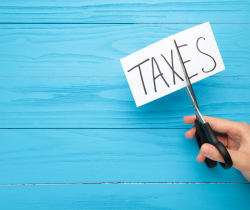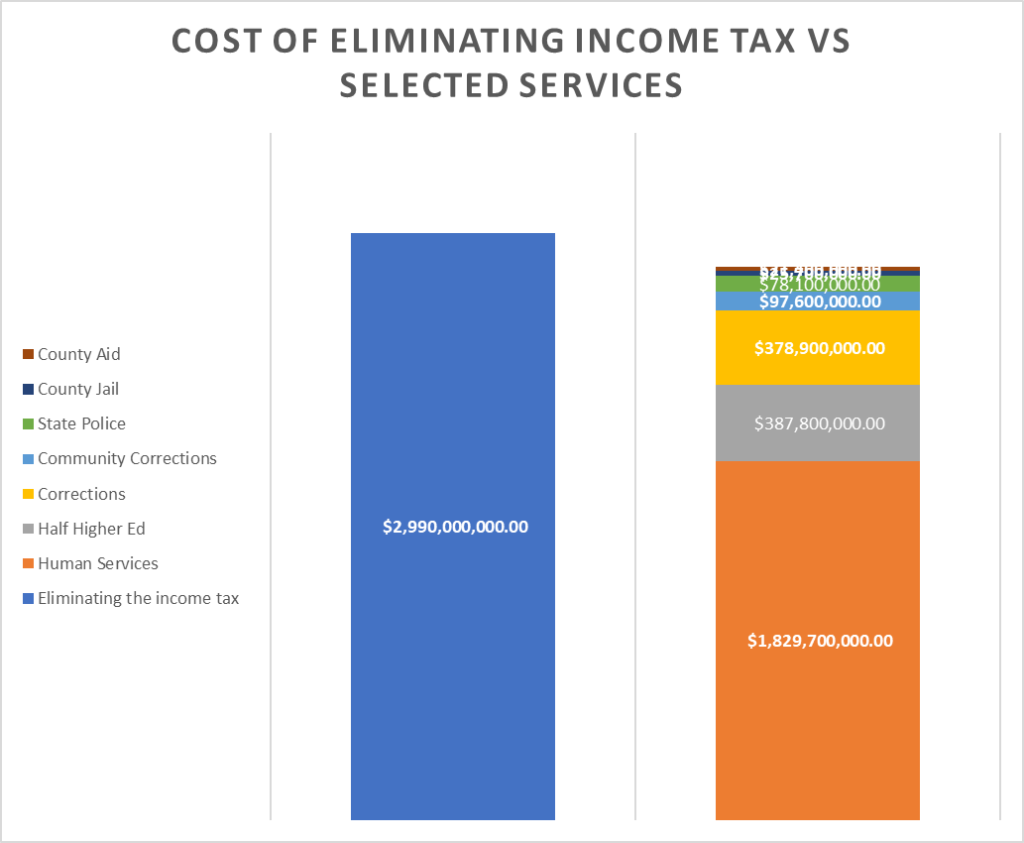
We all want to live in a state with great schools, well-maintained infrastructure, thriving communities, and strong families. But Arkansas’s Governor and many legislative leaders have expressed their support for sharply cutting – or even eliminating – our personal income tax, which would undermine our ability to ever achieve this goal.
Not only would slashing the personal income tax make it hard to create a state where every child can thrive, but it would imperil our ability to provide even the most basic public services. These tax cuts would largely flow to the wealthy, who have benefited from a decade of tax cuts, leaving most workers and families with hardly any benefit at all..

Source: Institute on Taxation and Economic Policy
More than four-fifths of the total tax cut would go to the richest 20% of taxpayers. The bottom 60% of taxpayers – those with yearly incomes below $63,000 – would receive only 10% to split between them.
To add insult to injury, those workers and families are already paying more in taxes as a share of their income at the state and local level:

Source: Institute on Taxation and Economic Policy
That’s important because our state will always need to pay for schools, roads, and other services people and communities rely on every day. And the personal income tax is the only state-level tax that asks more affluent Arkansans to pay their fair share. To put that into perspective, the average tax cut for an Arkansan in the top 1% would be more than $51,000 from a personal income tax elimination. That’s more than the average Arkansan earns annually, and even more than the new minimum $50,000 teacher salary.

Source: Institute on Taxation and Economic Policy
State experts’ most recent economic forecast projected that the personal income tax would bring in $2.9 billion in revenue for the 2023 budget year—which is nearly half of Arkansas ‘s entire $6 billion state budget.
For perspective, $2.9 billion is more than we spend on behavioral health, early childcare, and foster care combined. In fact, if we eliminated the entire agency budget for human services that funds those programs, we would still need to eliminate the Division of Corrections and the Division of Community Corrections, County Aid, State Police, County Jails, and half our funding for Higher Education.

Source: author’s calculations of DFA FY23 forecast located here: https://www.dfa.arkansas.gov/images/uploads/budgetOffice/biennial_gr_forecast_2023_2025.pdf
Past experience is clear that tax cuts don’t deliver promised economic boost, and that resulting revenue shortfalls shift more costs to parents and teachers, push up tuition for college students, leave people without access to affordable health insurance, and cause delays in highway repairs and emergency response times, among other harms.
Take Kansas. Lawmakers in 2012 and 2013 approved massive income tax cuts sold in large part by claims that they would deliver a “shot of adrenaline” to the state’s economy, as then-Governor Sam Brownback put it. But it didn’t turn out that way, as the state’s private sector lagged behind neighboring states and the nation overall for the next few years. To deal with the revenue losses, the state imposed unprecedented cuts in public services across the board, as well as unorthodox budget gimmicks to mask the full damage. The harm was so severe that in 2017, a bipartisan majority of lawmakers rolled back most of the tax cuts — overriding Governor Brownback’s veto in the process — to put the state back on firmer ground.
Additional evidence closer to home confirms that an economic boost from tax cuts is highly unlikely, at best. A report authored by Moody’s Analytics and commissioned by the legislature in 2021 showed that cutting our top tax rate from 5.9% percent to 5.5% percent would grow our state economy by less than one-tenth of a percent over a decade, a paltry return when compared to the enormous revenue cost of the cuts.
And even that projection is optimistic because they did not consider the impact on spending. An earlier outside analysis for the Tax Reform and Relief Legislative Task Force in 2018 calculated that, due to cuts to government services, tax cuts would cause economic activity and job growth to actually fall. That’s because every dollar we lose to tax cuts is a dollar the state can’t use to repair faulty roads and bridges, hire new teachers and pay current ones fairly, or invest in other people and services that are essential foundations of strong economic growth.
Policymakers might also consider looking to raise other taxes to find a way to replace the revenue lost from income tax cuts, a swap that’s likely to wind up hurting most regular Arkansans in the end. That’s because states without an income tax, the state would have to raise more revenue in the form of sales taxes, excise taxes, and property taxes – all of which fall more heavily on lower-income and working-class Arkansans.
The math and evidence are clear: The costs of cutting income taxes are borne by Arkansans with the least in the form of cut services or higher sales and property taxes, while the benefits accrue almost entirely to the wealthiest Arkansans. The alleged economic benefits are almost surely a mirage, and in fact our economy is likelier to shrink than grow if we hamper our ability to provide high-quality public services that support both businesses and workers. Arkansans deserve a better deal.
